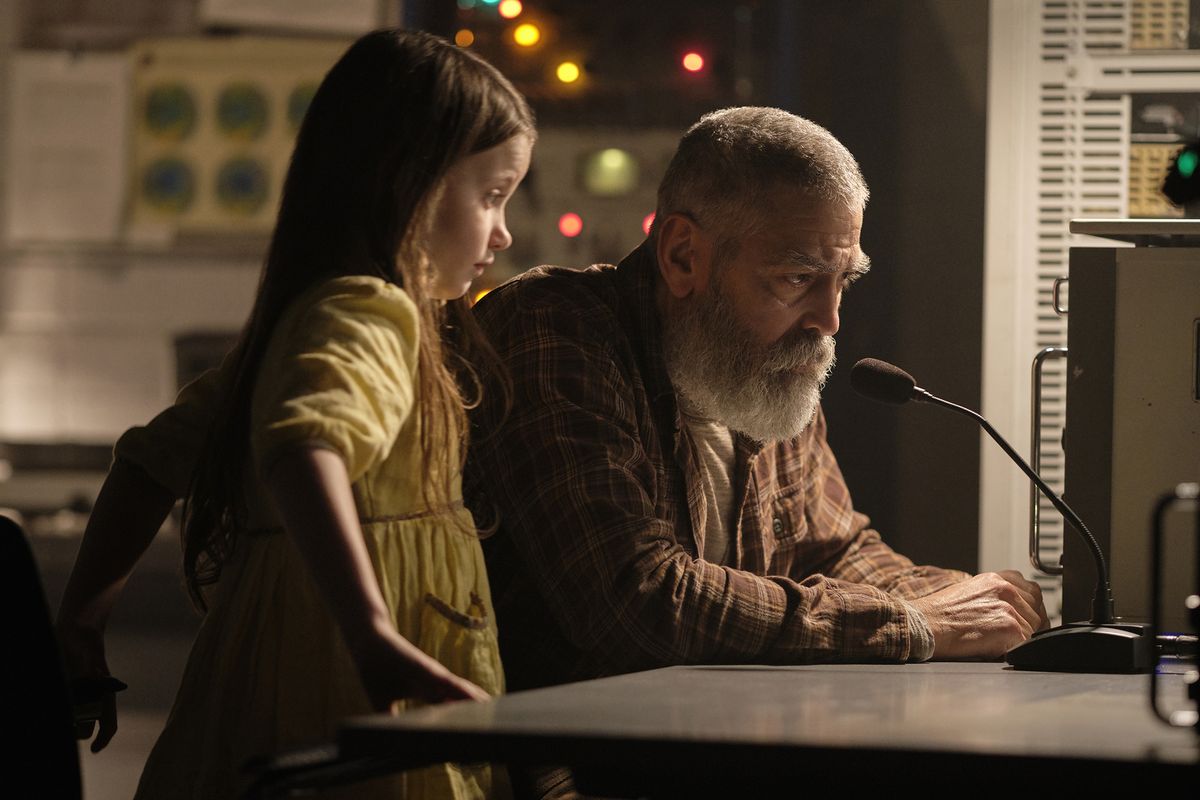Review: George Clooney dazzles in front of – and behind – the camera in ‘The Midnight Sky’

Set in the year 2049 in the immediate aftermath of an unspecified global calamity that appears, based on scant but at times scary evidence, to be both environmental and technological – perhaps even financial, political and cultural – “The Midnight Sky” only looks like a disaster film. Slyly, and by misdirection that cleverly conceals its true intent until the poignant end, it reveals itself to be a story of regret over a lost opportunity for connection.
George Clooney, who also directed Mark L. Smith’s smart adaptation of Lily Brooks-Dalton’s 2016 novel, plays the fulcrum of the film’s deft pivot: Augustine Lofthouse, an astronomer stationed at an observatory in far-northern Canada, inside the Arctic Circle. As the film opens, and Augustine’s research colleagues are being evacuated by plane to their homes – and an unknown fate – he alone has decided to remain. It’s not that Augustine is bound by an unreasonable sense of duty, or is simply foolhardy, as one of his co-workers suggests to the scientist.
If our protagonist, who appears to have a serious illness, were “in a hurry to die,” Augustine responds, he’d be leaving with the others. Rather, it’s that Augustine, having spent his life as an explorer – albeit a vicarious, earthbound one – has nothing and nobody to go back to. Shortly afterward, two things happen. Augustine becomes aware of a spacecraft named the Aether whose crew (Felicity Jones, David Oyelowo, Kyle Chandler, Demián Bechír and Tiffany Boone) is returning from a mission to explore a potentially habitable moon of Jupiter.
Having lost their communication with Earth, they need to be warned not to come back. The second thing is the appearance of a small, apparently mute girl (Caoilinn Springall), who seems to have been left behind in the rush to evacuate. Dubbed Iris, after a drawing she makes of the flower, the child becomes Augustine’s responsibility, along with the necessity of making his way to a second, stronger antenna some distance away, after the one at the observatory proves inadequate to connect with the Aether.
How these two things are related is only gradually disclosed in a story that jumps between the Arctic, the Aether and the past, where we see in flashback a younger Augustine (Ethan Peck) set up the idea of exploring the planets in search of a second home for man, who, it is implied, hasn’t taken care of his first one. That idea – that Augustine was a catalyst in sending the Aether off – is only part of a story that peels itself like an onion – and just as surely produces tears.
Meanwhile, the film is not without action. Although Augustine and the crew of the Aether can only observe the death of Earth from afar, they nevertheless encounter grave dangers: a wintry storm here below, an uncharted and destructive meteor field up above. Yet slowly the story becomes more and more interior as its point comes into focus.
As director, Clooney juggles the interconnecting stories adroitly, never giving away the tricks he’s playing on the audience while spinning the yarn, much of which, at least on the Aether, has explicitly to do with hope and longing. Jones’ Sully is expecting a baby with the Aether’s commander (Oyelowo), and several scenes aboard the ship feature a “Star Trek”-like holodeck-style technology that allows members of the crew to immerse themselves in virtual-reality evocations of the people and places they remember from Earth.
With Augustine, it’s more subtle, evoked both through his increasingly tender relationship with Iris and the flashbacks, which hint at a man who has only realized too late what he could have had. Beneath a bushy beard, often caked with frost, Clooney’s Augustine manages to convey a powerful sense that something has been forfeited forever. What that is, and how “The Midnight Sky” manages to show him reaching out, however imperfectly, to restore something broken is the message – and the magic – of this movie.